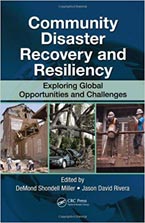 DeMond S. Miller, Jason David Rivera
DeMond S. Miller, Jason David Rivera
Editora CRC Press
Sinopse: In the past, societies would learn from disasters and move the location of their urban development to safer areas, allowing naturally occurring ecosystems to maintain themselves and for societies to exist symbiotically with the environment. These days, however, it seems that society no longer takes cues from the environment but rather relies on technical advancement to attempt to control and overcome the environment, sometimes with wholly unsuccessful and even catastrophic results.
Emphasizing non-traditional approaches to disaster recovery and rebuilding communities, Community Disaster Recovery and Resiliency: Exploring Global Opportunities and Challenges brings together leading research from top academics and scholars on the different ways various societies have experienced disasters, learned from them, and revised their thinking about building community preparedness and resiliency pre- and post-disaster.
- Provides a clear, concise, and up-to-date understanding of best practices for rebuilding community institutions and community development after a disaster;
- Focuses on integrated solutions for ecological restoration and community development in disaster recovery planning and implementation;
- Compares and contrasts community rebuilding between different nations at different stages of development, economic power, and stability;
- Includes case studies that illustrate best practices, integrating the concept of community and community rebuilding for local, national, and international stakeholders.
All chapters offer diverse community examples that form a framework for comparing best practices. They focus on integrated solutions for ecological restoration and community development and explain how communities can reduce their vulnerability to disasters and reduce recovery time following a disaster. The book indentifies the opportunities and challenges communities are most likely to face on the road to recovery and supplies the interdisciplinary, social scientific understanding required to effectively address those challenges.
